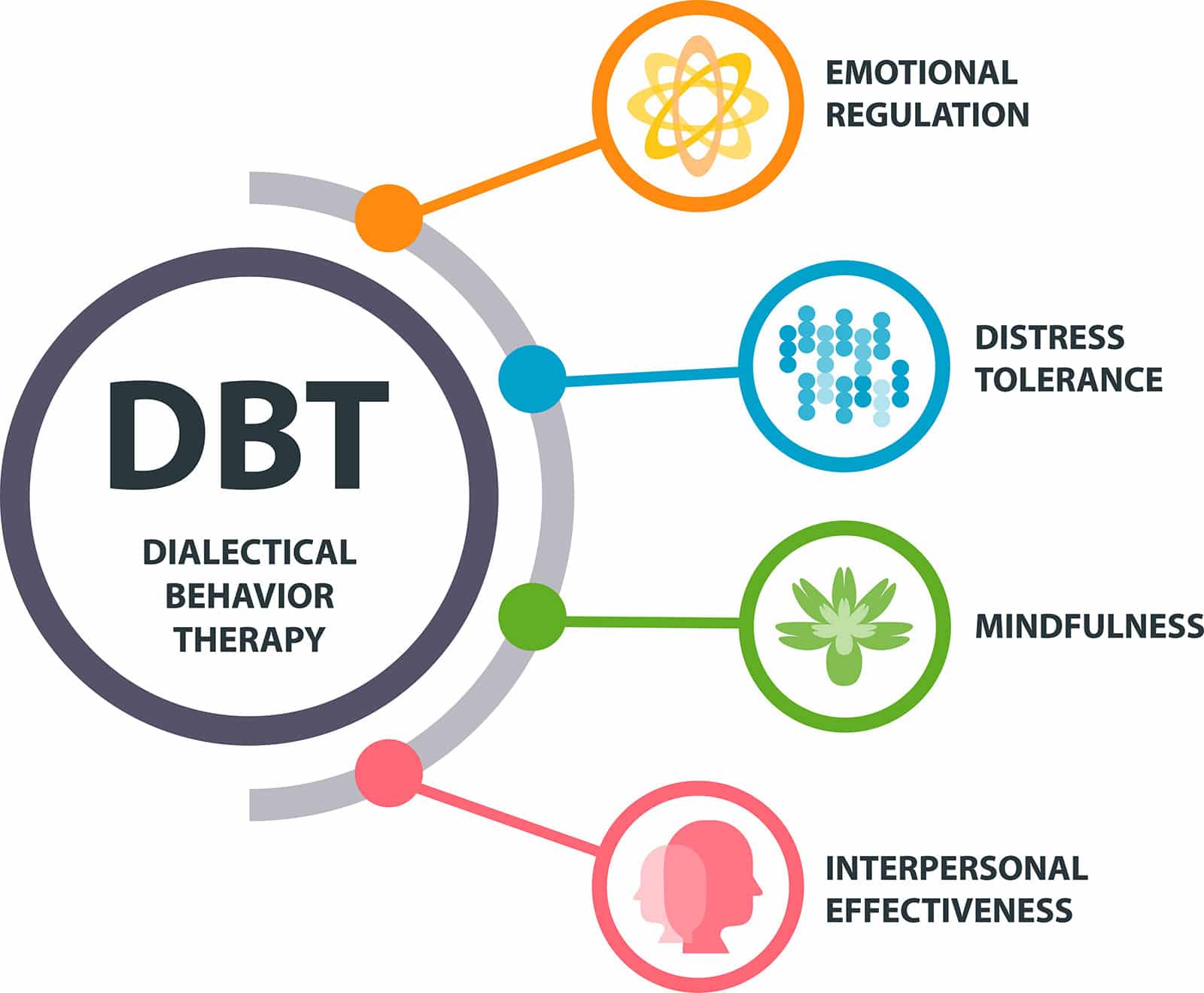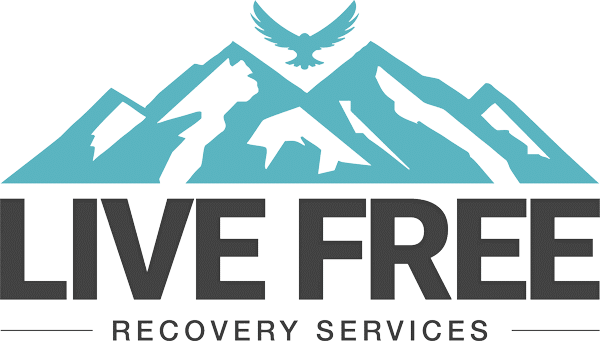Nearly eight million people suffer from co-occurring addiction and mental disorders in the U.S. For such patients, mental health problems can be a huge hurdle as they try to achieve sobriety. Fortunately, addiction specialists can address mental health problems and substance use disorder at the same time with dialectical behavior therapy (DBT). If you want to finally break the cycle of addiction and become a happier person, then you need to take a look at this overview of DBT to see if it’s the right treatment option for your needs.

Table of Contents
What is DBT?
DBT emerged from a series of clinical trials in which researchers experimented with a wide range of therapies for suicidal patients. As researchers conducted these studies, they found that many suicidal patients who suffered from borderline personality disorder (BPD), complex post-traumatic stress disorder (CPTSD), chronic depression, and other conditions did not make progress with established therapeutic techniques. Patients often felt dismissed or belittled by the heavy emphasis on direct problem solving in the common therapeutic approaches of the 1970s. In turn, many patients who went through cognitive-behavioral therapy (CBT) and other popular therapies would completely stop attending sessions after just a few weeks.
Researchers found that these patients were extremely sensitive to their environments, and external factors would significantly affect these patients’ emotional states and actions. To help patients cope with their environments more effectively, researchers devised an approach that emphasized acceptance (validation) and warmth while improving patients’ mindfulness, distress tolerance, emotional regulation, and interpersonal effectiveness. Dialectical behaviour therapy was developed in the 1970s by Marsha Linehan, an American psychologist. It is an evidence-based approach to help people regulate emotions. The sections below explore these four core modules of DBT in greater depth.
Mindfulness
Before patients start developing any other skills, they must be able to practice mindfulness. In the context of DBT, mindfulness involves paying attention to the present moment and accepting one’s thoughts and feelings without judgment. The therapist helps the patient hone this skill through meditation and various mindfulness exercises. To make progress, a patient must be able to accept change, and the therapist incrementally introduces new positive lifestyle changes to the patient to improve their behaviors. The patient must accept and maintain each change until they’re ready to make a new change. The cycle repeats until the patient has made enough positive lifestyle changes to effectively manage their condition.
Distress Tolerance
Sometimes, there are external factors in a person’s life that they simply cannot change. Unfortunately, many addicts and people suffering from mental disorders engage in negative behaviors to cope with these unavoidable negative people or circumstances. In order to avoid using drugs or self harming, patients must be able to tolerate negative external factors. In DBT, therapists help patients develop healthy coping skills to minimize the impact of bad thoughts and distressing events. Common distress tolerance skills include self-soothing techniques, self-distraction, and radical acceptance. Distress tolerance techniques help prepare you for intense emotions and impulsivity, and empower you to cope with them with a more positive long-term outlook.
Emotional Regulation
Patients who struggle with addiction and co-occurring mental disorders often feel like they have no control over their emotions. Such patients may rapidly shift between anxiety, anger, depression, and frustration when they feel overwhelmed. To gain some semblance of control in life, they may take drugs, overeat, harm themselves, have unprotected sex, or engage in other maladaptive behaviors.
Before patients can control their emotions, they must first be able to recognize and differentiate their emotions. Once they’re able to understand their emotions, the patient learns how to change unwanted emotions by responding to them with the opposite emotion. With this skill, they can make plans to positively respond to future negative emotions and use mindfulness techniques in crisis situations.
Interpersonal Effectiveness
Toxic interpersonal relationships are extremely common among addicts and people who struggle with certain mental disorders. Individuals with these disorders often don’t know how to maintain their boundaries or treat others with respect, so they are more susceptible to abuse. At the same time, they are also more likely to abuse others. Without good interpersonal skills, a patient will experience a lot of negative emotional interactions, which can drive the patient to use drugs or alcohol as a coping mechanism. Therapists help patients learn how to act respectfully towards others, maintain their self-respect, and assert themselves so that they can enjoy more positive social connections.
DBT as an Addiction Treatment
Individuals who struggle with addiction face many of the same challenges as people who suffer from BPD, CPTSD, and other serious mental disorders. Without adequate treatment, a mental disorder can exacerbate a patient’s addiction. The patient may consume an addictive substance to manage the symptoms of their mental disorder, which can make them more reliant on the substance to function and worsen their mental disorder at the same time. Since DBT also helps patients manage mental disorders, the approach can give patients a strong foundation of emotional resilience to draw from as they attempt to achieve sobriety.

Components of a DBT-Based Addiction Treatment Program
Individual Therapy
In an individual therapy session, the patient speaks with a therapist in a private setting. During sessions, the patient shares their struggles with the therapist and slowly works their way through the four DBT modules. Therapists help patients by providing direction in early sessions, motivating patients to change, and giving the patient the autonomy to shape the direction of their treatment after the beginning stages of DBT. Individual therapy sessions usually last around one hour.
Group Skills Training
Interpersonal skills can be very challenging to develop, so they require a lot of practice. Group skills training sessions allow patients to simulate interpersonal conflicts and challenging social situations. With sustained practice, patients are much more able to act respectfully, set boundaries, and maintain their self-respect in real-world situations.
Most therapists also conduct group talk therapy sessions. In group talk therapy (psychotherapy), group members discuss their successes, challenges, and experiences with addiction and mental health treatment in a nonjudgmental environment. Many patients don’t have any other opportunities to express these thoughts and feelings to their peers or family members, so group therapy is a great way for patients to vent and connect with likeminded people.
Phone Coaching
DBT patients typically require a lot of help and attention as they develop their coping skills. For this reason, most DBT therapists allow patients to call them between sessions to discuss emerging challenges and receive real-time guidance in difficult situations. Because addiction patients often face temptations between in-person sessions, phone coaching sessions are an invaluable tool for preventing relapse.
Benefits of Using DBT for Addiction Treatment
Improved Emotion Regulation
Many addicts associate their consumption habits with particular emotional states. For example, while one alcoholic may routinely pour a shot whenever they feel angry, another alcoholic may buy an 18-pack of beer to cope with sadness or disappointment. DBT gives patients the necessary skills to minimize the impact of negative emotions and quickly replace them with more positive emotions. When bad emotions can’t linger, they are much less likely to negatively impact an addict’s decisions.
Reduced Substance Use and Relapse Rates
After several DBT sessions, patients have the skills to understand their emotions, accept their momentary feelings and circumstances, resist negativity, and positively interact with others. With these skills, patients are less likely to get into stressful situations, and they’re more prepared to deal with negative emotions in healthy ways. Drugs are no longer a necessary coping mechanism for patients who have been through DBT, so they are much less likely to relapse.
Enhanced Interpersonal Relationships
A bad relationship can wreak havoc on a person’s mental health. Unfortunately, many addicts do not have the right perspective or enough self-respect to know what a healthy relationship entails, so they often end up in extremely toxic situations with friends, family members, co-workers, and acquaintances. Without strong interpersonal skills, addicts are more likely to succumb to peer pressure or use drugs to cope with negative social interactions. By understanding and practicing positive social skills in DBT, patients are more able to resist temptation, make meaningful friendships, and avoid negative social influences.
Disadvantages of Using DBT for Addiction Treatment
Time Commitment
For most patients, a full course of DBT takes between six months and a year to complete. Some patients simply do not have the time for that degree of treatment, and planning so far ahead isn’t always feasible. If something happens that prevents the patient from completing a full course of DBT, then they may regress and lose skills that took months to build. On top of that, the patient will have a harder time resisting temptation if they have not completed all four DBT modules.
Finding Trained DBT Therapists
Therapists must go through rigorous training to effectively administer DBT. This training takes a lot of time, money, and effort, so only a minority of therapists and healthcare providers offer DBT treatment. Because of this, the therapists who have the necessary qualifications to help addiction patients with DBT tend to have long waitlists for new patients.
Financial Considerations
Skilled DBT therapists can be very hard to find. On top of that, DBT therapists are often fully booked, so they have to charge higher prices for their services. Patients often spend over a thousand dollars per month for DBT, and a full course of DBT can take up to a year. Because of this, DBT is not financially feasible for many patients. Thankfully, some health insurance policies cover DBT, and many therapists offer flexible payment options for patients in difficult financial situations.
How Do I Know if DBT Is Right for Me?
While DBT is the best option for some patients, it’s not a great choice for everyone. Effective addiction therapy programs are a big commitment, so you don’t want to undergo the wrong kind of therapy. Thus, you should consider the following factors when deciding whether you should receive DBT.
Your Current Struggles
DBT is a great choice if you currently struggle with thoughts of suicide attempts, BPD, CPTSD, or another serious mental disorder. Otherwise, you may want to look into CBT, motivational interviewing, or another common therapeutic approach. Other approaches take less time than DBT and focus more specifically on positive behavioral changes, so they are great for addicts who don’t need long-term treatment, phone calls between sessions, or an extremely high amount of attention.
Your Past History of Addiction Treatment
Which therapeutic approaches have you tried in the past? Have these approaches worked for you? If you haven’t had good experiences with CBT or other common approaches, then you may want to try DBT. Email your previous therapists if you’re not sure about which approaches they used. Alternatively, you can describe your past sessions to a new therapist, and they’ll likely be able to identify your previous therapists’ approaches.
A Therapist’s Recommendation
The best addiction therapists have worked with patients in a wide range of circumstances. As a result, they have the necessary knowledge and experience to recommend an effective approach to most patients. No reputable therapist is going to push you to try DBT if it’s not the best option for your unique needs. After all, therapists want to see their patients make progress. Therapists have no incentive to administer the wrong kind of treatment, so you should trust your therapist’s judgment when they recommend an approach.
Achieve Sobriety With Professional Addiction Treatment
Addiction and co-occurring mental disorders can cause your life to spiral out of control. As long as drugs or alcohol play a role in your life, you will always be one dose away from death or disaster. You can’t live happily until you address your addiction and improve your mental health, so you need to reach out to Live Free Recovery Services today to learn more about effective DBT-based addiction treatment programs.
FAQ
What is Dialectical Behavior Therapy (DBT)?
How does DBT help with addiction treatment?
What are the four main components of DBT?
What are the core DBT skills?
How long does DBT treatment typically last?
Can DBT be combined with other addiction treatment methods?
Is DBT effective for treating co-occurring mental health disorders?
How can I find a DBT therapist or program for addiction treatment?
Is DBT suitable for everyone with addiction issues?
What can I expect during a DBT session?
Published on: 2023-04-22
Updated on: 2024-09-26
